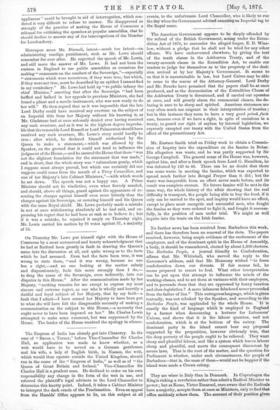No further news has been received from Barbadoes this week,
and there has therefore been no renewal of the riots. The papers received, however, bring ample evidence of the excitement of the employers, and of the dominant spirit in the House of Assembly, a body, it should be remembered, elected by about 1,300 electors. The Barbados People, a journal friendly to Confederation, affirms that Mr. Whitehall, who moved the reply to the Governor's address, said that Mr. Hennessy wished " to force confederation down our throats. If fair means fail, he seems prepared to resort to foul. What other interpretation can be put upon this attempt to influence the minds of the working-classes, and to set them at variance with their employers, and to persuade them that they are oppressed by heavy taxation and class-legislation ? A more infamous falsehood never proceeded from the father of lies." This outrageouslanguage, which is given textually, was not rebuked by the Speaker, and according to the Barbados People, was applauded by the whole House. It is exactly the kind of language which is employed in England by a farmer when denouncing a lecturer for Labourers' Unions, and shows that it is the labour question, and not confederation, which is at the bottom of the outcry. The dominant party in the island cannot bear any proposal supported by the proposition, however obviously true, that the deep poverty of the people ought to be relieved. They want cheap and plentiful labour, and like a system which leaves labour cheap and plentiful, and meets the consequent discontent by severe laws. That is the root of the matter, and the question for Parliament is whether, under such circumstances, the people of Barbadoes—that is, the mass of them—would not be happier if the island were made a Crown colony.


































 Previous page
Previous page